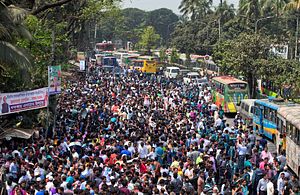As Bangladesh enters into its election year, long-simmering political tensions are on the boil. Any escalation would be detrimental to political stability and economic development in Bangladesh and the region.
Bangladesh’s two main parties, the ruling Awami League and the opposition Bangladesh Nationalist Party (BNP), have been in a deadlock for years over the legitimacy of the government. The BNP leadership accuses the Awami League administration of fraud and vote-rigging in the last national polls. It is demanding that the December national election be overseen by a politically neutral caretaker administration, threatening to boycott the polls if it is not.
Being the biggest political adversary to the ruling party, the BNP has naturally come into the political crosshairs. BNP chief Khaleda Zia herself has been bombarded with numerous arrest warrants and charge sheets intended to pressure her into facing trial. Several BNP party leaders have also not spared from the political assaults.
Now, the political climate has further worsened with the recent conviction of Zia in a politically sensitive corruption case. She was sentenced to five years’ imprisonment on February 8 for allegedly embezzling over 21 million Bangladeshi taka (about $252,000) intended for the the Zia Orphanage Trust from 2006 to 2008.
Last week, in the latest development, the Supreme Court overturned a decision by a lower court to grant Zia a four-month bail. This means she is to remain behind bars on corruption charges until a hearing on May 8 for her temporary release. As a response, the BNP leadership issued a statement condemning the Supreme Court’s ruling.
“The intention behind the case was to keep her away from politics and also from the next election. The government wants to hold a one-sided election like the one held on January 5, 2014,” BNP Secretary General Mirza Fakhrul Islam Alamgir said in a recent interview.
The current constitution of Bangladesh prohibits anyone convicted for more than two years from taking part in a national election. While Zia can still contest if an appeal is pending, her political future appears to be sealed.
Meanwhile, the BNP and its supporters are already showing signs of frustration. Last month, violence broke out nationwide as thousands of BNP activists took to the streets demanding Zia’s immediate release. At least five police officers were injured in clashes with BNP activists. Around 4,200 individuals were detained over the protests. Tensions could boil over if Zia’s imprisonment drags on and the December national election is not held under a neutral government.
Bangladesh is one of the world’s poorest nations. Its dysfunctional politics and widespread turbulence in periods preceding and after national elections have always prompted capital outflows and disrupted trade. Although the national economy has been slowly improving, many businesses worry that the BNP will once again break the political calm in the upcoming December elections.
Moreover, widespread political violence will also hinder regional economic integration. Bangladesh is seen as critical to China’s Belt and Road Initiative. At the same time, the country is also planning to develop economic corridors to link up with other parts of South Asia. Increased political conflict will indubitably affect interests far wider than its own.
Lau Seng Yap is a freelance writer and previously worked as a security risk analyst with GlobalMomentum Pte Ltd. He specializes in analyzing geopolitical risks and security threats in the Asia-Pacific region.

































